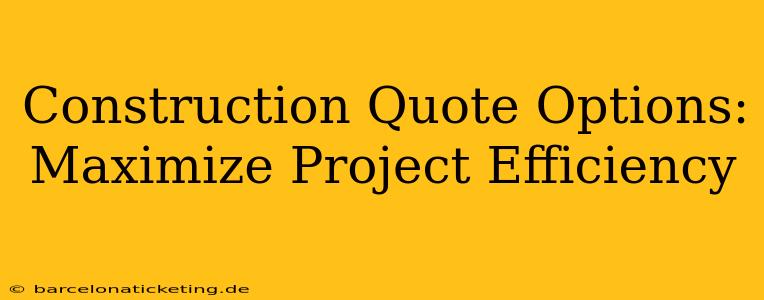Winning construction projects hinges on more than just competitive pricing. Submitting clear, comprehensive, and strategically crafted quotes is paramount to securing contracts and ensuring project efficiency from the outset. This guide explores various construction quote options, highlighting their strengths and weaknesses to help you choose the best approach for maximizing your project's success.
What are the Different Types of Construction Quotes?
Several quote types cater to different project needs and complexities. Understanding these nuances allows you to present the most appropriate and effective proposal. Let's delve into the key options:
1. Fixed-Price Quotes (Lump Sum):
This traditional method outlines a fixed total price for the entire project, encompassing all materials, labor, and anticipated expenses. It provides clients with budgetary certainty, minimizing the risk of escalating costs.
Strengths: Predictable costs for the client; clear project scope; simplifies budgeting.
Weaknesses: Requires detailed planning and accurate cost estimations upfront; limited flexibility for changes; potential for disputes if unforeseen issues arise. Best suited for projects with well-defined scopes and minimal expected changes.
2. Time and Materials (T&M) Quotes:
This approach charges clients for the actual time spent on the project and the materials used. Hourly rates for labor are established, and materials are billed at cost plus a markup.
Strengths: Flexibility to adapt to changing project requirements; suitable for projects with undefined scopes or potential revisions.
Weaknesses: Less predictable costs for the client; requires meticulous time tracking; potential for cost overruns if not managed effectively. Best suited for smaller projects, renovations, or projects with evolving designs.
3. Cost-Plus Quotes:
Similar to T&M, this option bills for actual costs plus a pre-agreed percentage or fixed fee for overhead and profit. This offers transparency regarding expenses but requires a high level of trust between contractor and client.
Strengths: Transparency in costs; suitable for complex projects with uncertain scopes; allows for collaborative decision-making.
Weaknesses: Requires robust cost tracking and reporting; potential for disagreements on cost allocations; may require significant client involvement. Best suited for large, complex projects with potential for significant changes.
4. Unit Price Quotes:
This method specifies a price per unit of work (e.g., per square foot of flooring, per linear foot of fencing). The total cost is calculated by multiplying the unit price by the quantity of work required.
Strengths: Easy to understand and compare; allows for flexibility in scope adjustments; suitable for projects with easily quantifiable units of work.
Weaknesses: Requires precise quantity estimations; can be less accurate for complex projects; potential for disputes if quantities differ significantly from estimates. Best suited for projects with repetitive tasks or well-defined units of work.
How to Choose the Right Quote Option for Your Construction Project?
Selecting the appropriate quote type depends heavily on several factors:
- Project Scope: Is the project well-defined or prone to changes? Fixed-price is best for well-defined projects, while T&M or Cost-Plus are more suitable for those with evolving scopes.
- Client Requirements: What level of cost certainty does the client desire? Fixed-price offers predictability, while T&M or Cost-Plus offer more flexibility but less certainty.
- Risk Tolerance: How comfortable are you with the potential for cost overruns or unforeseen issues? Fixed-price minimizes risk for the contractor but requires accurate upfront planning.
- Project Complexity: Simple projects with straightforward scopes are well-suited for fixed-price or unit price quotes. Complex projects benefit from T&M or Cost-Plus approaches.
What are the common mistakes to avoid when creating a construction quote?
- Underestimating costs: Thorough cost analysis, factoring in all potential expenses (labor, materials, permits, equipment, overhead), is crucial.
- Unclear scope of work: Ambiguous descriptions lead to misunderstandings and disputes. Be precise and detailed in your description of the work included.
- Missing crucial information: Include payment terms, project timeline, warranty information, and contact details.
- Ignoring potential risks: Identify and address potential risks and contingencies upfront.
By carefully considering these factors and quote options, construction professionals can effectively maximize project efficiency and profitability, fostering positive client relationships and securing future opportunities. Remember, a well-crafted quote is not just a price; it’s a reflection of your professionalism and commitment to project success.

